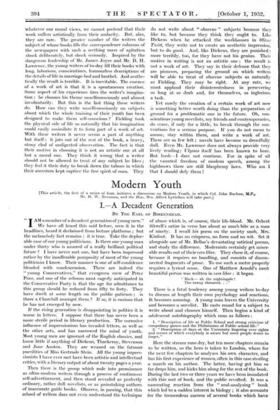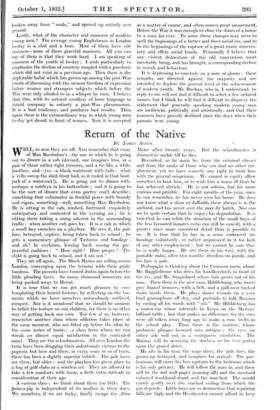Modern Youth
[This article, the first of a series of four, initiates a discussion on Modern Youth, in which Col. John Buchan, M.P., Mr. H. W. Nevinson, and the Hon. Mrs. Alfred Lyttelton will take part.]
1.—A Decadent Generation
BY THE EARL OF BIRKENHEAD.
" T AM a member of a decadent generation of young men."
We have all heard this said before, seen it in the headlines, heard it declaimed from lecture platforms ; but the melancholy fact remains : it is true. Take the deplor-, able case of our young politicians. Is there one young man under thirty who is assured of a really brilliant political future ? I have never met one, but have been impressed rather by the insufferable pomposity of most of the young politicians I know. Their manner is one of self-confidence blended with condescension. There are indeed the " young Conservatives," that evergreen crew of Peter Pans, and one of the reforms most eagerly anticipated in the Conservative Party is that the age for admittance to this group should be reduced from fifty to forty. They have dwelt at some length on the public patience ; is there a Churchill amongst them ? If so, it is curious that lie has not emerged by now.
If the rising generation is disappointing in politics it is worse in letters. I suppose that there has never been a more sterile period in literary production. The corrosive influence of impressionism has invaded letters, as well as the other arts, and has narrowed the mind of youth.. Most young men are ignorant of the English classics, and know little if anything of Dickens, Thackeray, Stevenson- and Jane Austen. They are weaned on the fatuous puerilities of Miss Gertrude Stein. All the young impres- sionists I have ever met have been artistic and intellectual critics, with a literary output of about twenty pages a year.
Then there is the group which rode into prominence as ultra-modern writers through a process of continuous self-advertisement, and then stood revealed as perfectly ordinary, rather dull novelists, or as painstaking authors of inaccurate guide books. Observe, in passing, that this school of writers does not even understand the technique of abuse which is, of course, their life-blood. Mr. Osbert Sitwell's satire in verse has about as much bite as a man of ninety. I recall his poem on the society snob, Mrs. Kinfoot. It has no crispness, no form and no wit. Set it alongside one of Mr. Belloc's devastating satirical poems, and study the difference. Modernists certainly get miser- able results out of their viers fibre. They chose it, of course, because it requires no handling, and consists of discon- nected fragments of prose. To use such a metre properly requires a lyrical sense. One of Matthew Arnold's most beautiful poems was written in vers libre : it began
" Hark— ah the nightingale ! The tawny throated.. .
There is a fatal tendency among young writers to-day to discuss at length their own psychology and reactions. It becomes amusing. A young man leaves the University and becomes a novelist. He casts round for a subject to write about and chooses himself. Then begins a kind of adolescent autobiography which runs as follows : 1. " Description of life at Public School and strong criticism of compulsory games and the Philistinism of Public school life."
2. " Description of days at tho University lingering over sights and scenes of which everybody is aware but most people desire to forget."
Here the stream runs dry, but ten more chapters remain to be written, so the hero is taken to LondOn, where for the next few chapters he analyses his own character, and has his first experience of women, often in this case stealing a march on his author. The latter, having got him so far drops him, and kicks him along for the rest of the book. During the last two or three years we have been inundated with this sort of book, and the public revolted. It was a nauseating reaction from the " soul-analysing " book which led to a sudden interest in biology ; it also accounts for the tremendous success of several books which have- broken away from " and- opened up entirely new ground.
Lastly, what of the character and manners of modern Young men ? The average young Englishman in London to-day is a clod and a bore. Most of them have vile manners—none of them graceful manners. All you can say of them is that they work hard. I am speaking of manners of the youth of to-day ; I wish particularly to emphasize the decline of courtesy coupled with a gaucherie which did not exist in a previous age. Then there is the deplorable habit which has grown up among the post-War youth of discussing with the utmost freedom of expression - before ,women and. strangers subjects which before the War were only alluded to in a whisper by men. I believe that this, with its natural corollary of loose language in mixed company: in entirely a post-War phenomenon. It is a bad tendency, and produces bad results. Then again there is the extraordinary way in which young men to-day get drunk in front of women. Now it is accepted as a matter of tonne, and often causes great amusement. Before the War it was enough to close the doors of a house to a man for. ever. To some these changes may seem to spell the beginnings of a better and freer social era, and to be the beginnings of the rupture of a great many unneces- sary and effete social bonds. Personally I believe that any violent dislocation of the old convention must inevitably bring, and has brought, a corresponding decline in morals and behaviour.
It is depressing to conclude on a note of gloom : these remarks are directed. against the majority and are intended to deplore the general level of.the achievement. of modern youth. Mr. Buchan, who is, I understand, to reply to me will not find it.difficult to select a few isolated names, but I think he will find it difficult to disprove the statement that generally speaking modern young men are inefficient, politically and artistically, and that their• manners have gravely declined since the days when their parents were young.















































 Previous page
Previous page